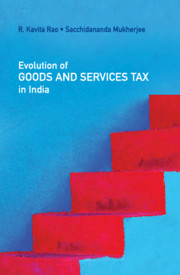Book contents
- Frontmatter
- Contents
- List of Figures
- List of Tables
- Acknowledgements
- List of Abbreviations
- Introduction
- Part I Genesis and Evolution of GST in India
- Part II Revenue Neutrality of GST
- 5 Estimation of Revenue Neutral Rates for Goods and Services Tax in India
- 6 New Assumptions, New Estimates: Scrutinising a New Report on Revenue Neutral Rate
- 7 Exploring Policy Options to Include Petroleum, Natural Gas and Electricity under the Goods and Services Tax (GST) Regime in India
- Part III GST Administration and Possible Impacts of GST on Indian Economy
- Conclusion: Impact of GST and What Might Happen
- Index
7 - Exploring Policy Options to Include Petroleum, Natural Gas and Electricity under the Goods and Services Tax (GST) Regime in India
from Part II - Revenue Neutrality of GST
Published online by Cambridge University Press: 26 April 2019
- Frontmatter
- Contents
- List of Figures
- List of Tables
- Acknowledgements
- List of Abbreviations
- Introduction
- Part I Genesis and Evolution of GST in India
- Part II Revenue Neutrality of GST
- 5 Estimation of Revenue Neutral Rates for Goods and Services Tax in India
- 6 New Assumptions, New Estimates: Scrutinising a New Report on Revenue Neutral Rate
- 7 Exploring Policy Options to Include Petroleum, Natural Gas and Electricity under the Goods and Services Tax (GST) Regime in India
- Part III GST Administration and Possible Impacts of GST on Indian Economy
- Conclusion: Impact of GST and What Might Happen
- Index
Summary
Introduction
Various taxes, duties, levies and cesses on petroleum products and natural gas generate substantial revenues to the Central and State Governments. The tax on petroleum products and corresponding change in prices generate both direct and indirect effects across the sectors. Petroleum products directly enter as an input into a large number of economic activities (e.g., transportation, electricity generation and fertiliser production). Apart from such direct uses, there are a number of indirect uses as well; for instance, since most commodities need to be transported for use by the final consumer, petroleum products enter into the picture. Therefore, changes in prices (or taxes) of petroleum products would have significant impact on the economy both through direct and indirect or cascading routes.
The present regime of taxation of petroleum products and electricity results in cascading of taxes. Built-in invisible taxes are expected to increase prices in the domestic economy and adversely affect competitiveness of Indian exports as well. Given that the country is working towards the introduction of a comprehensive GST regime, it is an opportune moment to ask whether the proposed GST design is appropriate or whether significant degree of cascading remains. This chapter seeks to explore alternative configurations of the tax regime, with specific reference to petroleum products, and evaluate the extent of cascading under each. Given that these goods provide a major share of the revenues of the Central and State governments in indirect taxes, the comparison is attempted assuming revenue neutrality under all scenarios.
The other significant aspect of the petroleum sector is that the present administered pricing mechanism does not allow full price pass through for some refinery products (domestic LPG, PDS kerosene, diesel and petrol). This results in under-recoveries for oil marketing companies (OMCs). However, the government has not been providing full compensation to OMCs for such under-recoveries in sales of diesel and petrol. While part of the under-recovery is absorbed by the upstream oil companies, the rest remains stranded costs for the OMCs. The present system of disallowing compensation not only costs the Central Government exchequer (in terms of loss of dividend income), as most of the oil companies are under the Central Public Sector, but also provides a perverse incentive for not saving fossil fuels, thereby polluting the environment.
- Type
- Chapter
- Information
- Evolution of Goods and Services Tax in India , pp. 120 - 146Publisher: Cambridge University PressPrint publication year: 2019
- 3
- Cited by



